(VOVWORLD) - Some say animals can feel all the emotions that humans do. They experience joy, sadness, love, and get sick just as humans do. So if you mistreat them, can they forgive, and heal, and find hope again, as humans do? According to Four Paws, an animal welfare organization that rescues dozens of species, including endangered Asiatic black bears, they can. But as with humans, it often takes them a lifetime.
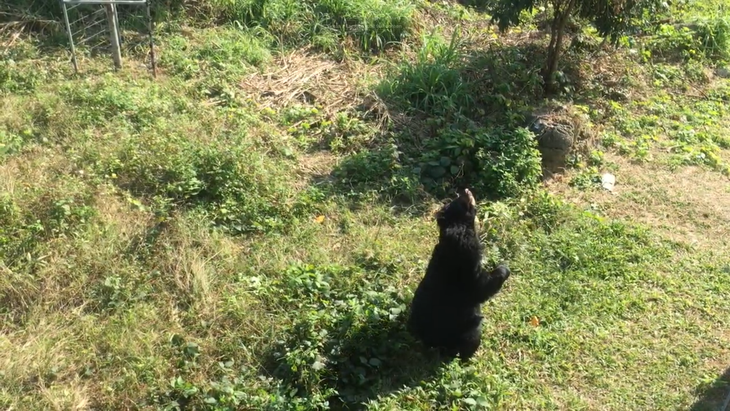 While there are not many Asiatic black bears left in the wild, FOUR PAWS Vietnam and the Bear Sanctuary in Ninh Binh have been working to save those who survived. (Photo: FOUR PAWS Vietnam) While there are not many Asiatic black bears left in the wild, FOUR PAWS Vietnam and the Bear Sanctuary in Ninh Binh have been working to save those who survived. (Photo: FOUR PAWS Vietnam) |
"Generally, when we rescue a bear, we assume that it has been recently sampled or regularly and frequently bile harvested," said Dr. Marc Golkel of Four Paws Vietnam.
On the morning of October 17th, 2023, Dr. Marc Golkel and Dr. Leslie Golkel, members of the animal welfare organization Four Paws Vietnam, arrived in Ho Chi Minh City after a 1,600km drive after receiving a call. They came to rescue a 150kg female Asiatic black bear from a local bile farm. They decided to name the bear Na. Na was the last surviving bear at the farm.
"We don't know exactly, but we estimate that for more than 20 years the farmer had bears, but the other bears had already died. So she was the last remaining bear at the farm and the farmer was concerned because she had some health issues and that’s the reason he contacted World Animal Protection and they put us in contact," said Leslie.
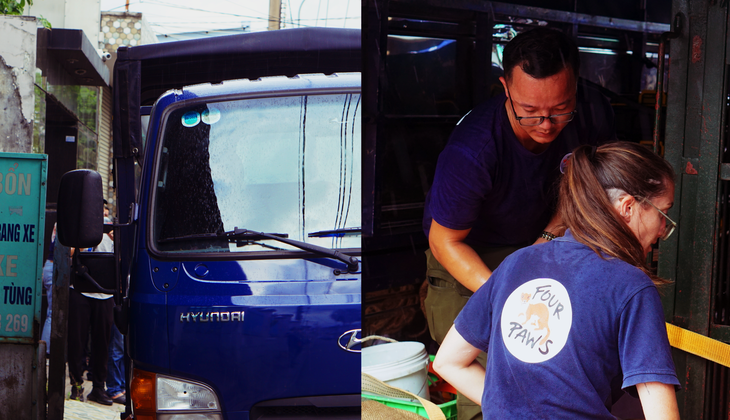 A team of rescue and medical experts is sent to Ho Chi Minh City almost immediately after FOUR PAWS received calls. (Photo: FOUR PAWS Vietnam) A team of rescue and medical experts is sent to Ho Chi Minh City almost immediately after FOUR PAWS received calls. (Photo: FOUR PAWS Vietnam) |
Marc had worked with wild animals for more than 7 years, and he said bears are usually resilient animals. But the number of diseases they found in the rescued bears far exceeded anything he has ever seen in a single animal, which is why it's always a race against the clock. Na’s case was no exception, said Marc.
"We did some invasive procedures. We had to remove two canine teeth, which are very large, and you have to remove a lot of bone to get down to them and remove them."
According to Marc, Na tolerated it very well while Leslie says: "There was not a moment where she was stressed. She enjoyed the transportation, and then we already started to give her some new food, and she really, really liked dragon fruits, because she had never had any fruits before."
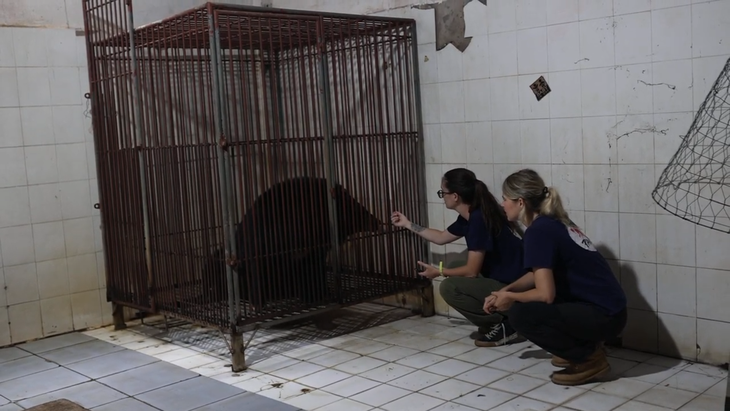 From behind the cage, Na makes her first contact with the team. (Photo: FOUR PAWS Vietnam) From behind the cage, Na makes her first contact with the team. (Photo: FOUR PAWS Vietnam) |
The life expectancy of an Asiatic black bear is 25 years in the wild, and 39 years in captivity. Marc and Lesley estimated that Na, as with most of their rescues, had been kept in a cage for at least 20 years. Some bears, however, had even less time left.
Jeremy Lamberton, Four Paws Vietnam’s Communications Manager, who has seen his fair share of goodbyes, told VOV that Na was their second rescue of 2023. Before her, the Four Paws rescue team brought back another Asiatic black bear named Khanh for emergency treatment. The best they could manage for Khanh, however, was to give him a name and the first and last proper meal of his life.
Jeremy: Khanh's last moments were… Just before he passed, he was tasting honey for the first time.
VOV’s reporter: Did he get a chance to eat it at all?
Jeremy: Yeah yeah yeah yeah. Couldn't pass urine… so much of his body was not working. But on his last day he got to try some honey and, you know, we gave him the best possible care until the last moment.
In 2022, it was reported that there were 294 bears still being kept on private farms in Vietnam. That number fell to 224 in 2023. How many of those ever made it out of their cage? And how many, like Khanh, could only enjoy their freedom for a few days? Either way, Jeremy said, they intended to save them all.
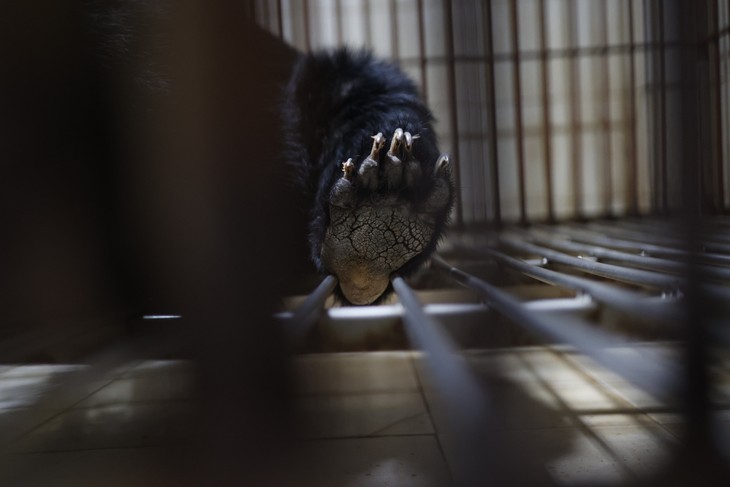 Na's feet show cracks, the results of roughly 20 years in captivity. (Photo: FOUR PAWS Vietnam) Na's feet show cracks, the results of roughly 20 years in captivity. (Photo: FOUR PAWS Vietnam) |
"One thing we get asked is: Was it worth it to go and rescue the bears for only two or three more days of their life? Absolutely. Yes,' affirmed Jeremy.
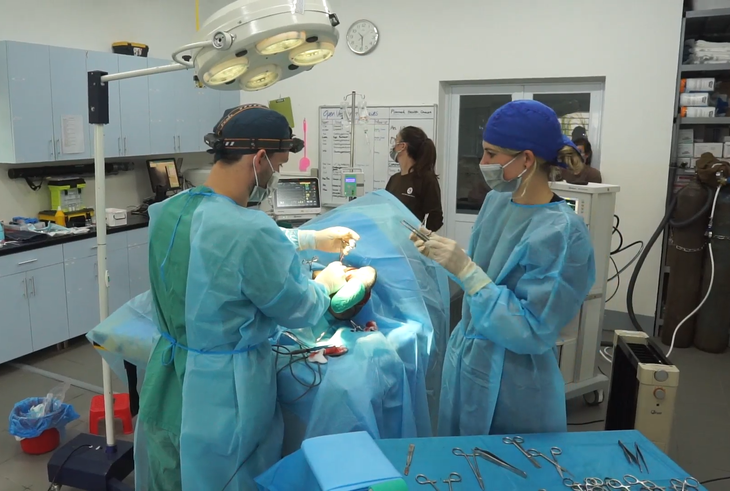 Many bears who arrive at the sanctuary have to receive operations due to their serious conditions. (Photo: FOURPAWS Vietnam) Many bears who arrive at the sanctuary have to receive operations due to their serious conditions. (Photo: FOURPAWS Vietnam) |
The endangered Asiatic black bears cannot reproduce well outside of their natural habitat. But at least here, Jeremy said, they can make their own choices – to eat, to sleep, to go outside whenever they want, and wait for people to change their abusive treatment. And we are starting to, said Nguyen Thu Trang, a tour guide at the Bear Sanctuary in Ninh Binh, where most rescued bears are enjoying the last few years of their lives.
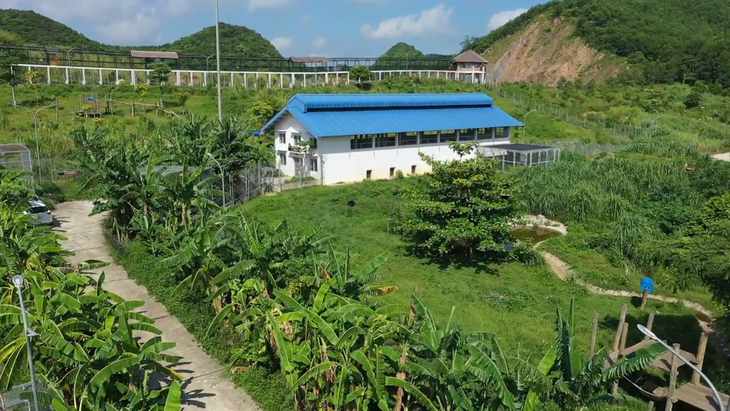 Bear Sanctuary in Ninh Binh, a project by FOUR PAWS Vietnam and bear Na's new home (Photo: FOUR PAWS Vietnam) Bear Sanctuary in Ninh Binh, a project by FOUR PAWS Vietnam and bear Na's new home (Photo: FOUR PAWS Vietnam) |
Trang said: "I usually take younger visitors to the guest lounge first and show them our bulletin boards introducing the bears. We have an area called the Skywalk where there are three observatories. The last observatory looks out to a nearby acacia forest and that's where we remember our bears who are no longer with us. We will soon have a memorial site for the bears."
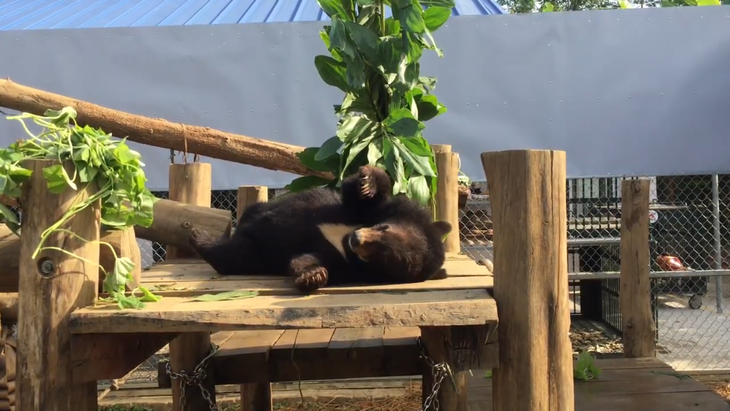 (Photo: FOUR PAWS Vietnam) (Photo: FOUR PAWS Vietnam) |
Jeremy: Would you like to leave a message?
VOV reporter: Yeah. I'm going to write something. Get well Na. Get well.
UPDATE: On November 29, 2023, bear Na took her first free step in the sanctuary. No longer under quarantine, Na is now with her brothers and sisters at the Bear Sanctuary in Ninh Binh and will enjoy a happy new life here. More information can be found at Bear Sanctuary NINH BINH Facebook page: